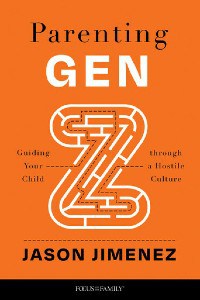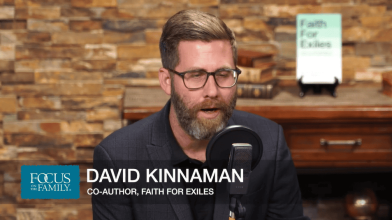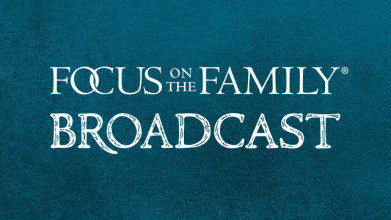Excerpt:
Jason Jimenez:
As a parent, you’re an advocator. You’re not the avoider, not the aggressor. You’re someone who stands in the gap, and is bracing where your child is at, where they’re developing, where their growing pains are, where some of those struggles are, and how you can then help them navigate with a Biblical world view.
End of Excerpt
John Fuller:
Well, that’s Jason Jimenez, and he joins us today on Focus on the Family to talk about parenting today’s Generation Z. I’m John Fuller, and your host is Focus President and author, Jim Daly.
Jim Daly:
You know John, young people today are facing so many challenges. I look through the lens of Trent and Troy, uh, my two boys in their early 20s now. But man, it’s, there’s everything coming at ’em, the social media stuff, advertising. And then, you know, it’s all different from when we were younguns.
John:
Mm-hmm, yeah. (laughs).
Jim:
And, uh, you know, I feel bad, and, uh, today we wanna concentrate on how to parent the Generation Z group.
Now, some of you may say, “What is Generation Z?” You know, you don’t even know where you’re at in that cluck of, uh, generational descriptors. But Generation Z is basically about 1997, ’98 to 2012, being born in that range. Trent and Troy were 2000 and 2002, so I have lived the dream.
John:
Mm-hmm. (laughs).
Jim:
But, there are some very specific things that this generation both exhibits and require, and we’re going to get into it today from a spiritual and emotional standpoint.
John:
Yeah, and Jason Jimenez is the founder of Stand Strong Ministries. Uh, he’s an author. He’s a national speaker. And he and his wife have four Gen Z kids. He’s done (laughs) a lot of work with young people. He’s going to talk, uh, about some of the concepts in his book, Parenting Gen Z: Guiding Your Child Through a Hostile Culture.
Jim:
Jason, welcome to the broadcast.
Jason:
Great to be with you guys.
Jim:
Hey, uh, you’re, as John said, the father of four Gen Z’ers.
Jason:
Mm-hmm.
Jim:
… and, uh, you have had the wonderful experience of parenting them. So, what stands out as so different from past generations?
Jason:
Yeah, that’s a great question. I mean, yeah, having four Gen Z’ers, you guys having some Gen Z’ers, you know, roughly, like I said, in the late 1990s, you know, into mid-2012 to 2015, right, before, you know, President Trump became, you know, President in 2016. What’s different actually to even millennials is that Gen Z are a lot more anxious than any previous generation. They-
Jim:
Right, l- l- l- lets talk about that.
Jason:
Yeah.
Jim:
Why is that?
Jason:
Well, one reason is because most of them actually come from more broken families.
Jim:
Hmm…
Jason:
There’s over 10 to 12 million Gen Z’ers who actually come from single families, and 80% of those single families are led by just a single mom.
Jim:
Mm-hmm.
Jason:
And then of course, you add all the technology since this generation was born, all they’ve known is social media devices, right? And so, learning how to communicate effectively isn’t something they do as well. And friendships is, is really an art that they do not how to achieve or to produce in their own life.
Jim:
Hm.
Jason:
So, the loneliness, the despair, a lot of them struggle with their own identity. And even figuring out what that is, that’s why the sexuality revolution that’s coming about where you define yourself, you know, through terms of your sexual desires, or your predilections has become a big frontal, uh, case for a lot of young people. So, this creates more anxiety in their lives. And then of course, sadly what we actually see when you trace Gen Z, unlike any other generation, a lot of them don’t actually get a lot of sleep.
John:
Hm.
Jason:
So, that’s adding to the deprivation that we’re seeing among this generation.
Jim:
Wow. It sounds bleak!
Jason:
It, it does sound bleak, but at the same time, and I talk about this in the book, is once… One quality that I’ve seen with parenting Gen Z is the creativity and the curiosity that consists with them. One thing that’s also amazing about Gen Z is that they are homebodies, meaning they love to be invested in family.
Jim:
Mm-hmm.
Jason:
And, they’re actually more in tune with reading and going outside of their opinions to learn things that maybe run contrary to what they believe to be true.
Jim:
Yeah. You know, I was at an event, uh, speaking, and we did a panel discussion as part of the overall event. And there were three of us Christian leaders on the stage being interviewed by John Stonestreet of the Colson Center.
Jason:
Oh, yeah, mm-hmm.
Jim:
And one, I don’t wanna out the person, but, uh, John asked the question, you know, how optimistic or pessimistic are you about the next generation. And this one particular guest said, “Oh, very pessimistic.”
Jason:
Hm.
Jim:
And, and then the event ended. I didn’t get a chance to jump out there. And what I wanted to say was, you know, when we as the older Christian community say those kinds of things… Seriously. There’s always going to be weaknesses in every generation, but certainly life gives you maturity and wisdom. So, we’re talking about teens and 20-somethings, you know?
Jason:
Mm-hmm.
Jim:
Where were you (laughs)-
Jason:
Mm-hmm.
Jim:
… in that phase of your life?
Jason:
Mm-hmm.
Jim:
But, I was thinking, boy, if we say that we’re really anxious about this next generation, we’re really saying we don’t trust God for putting the souls on this planet at the moment He wants ’em here.
Jason:
Mm-hmm.
Jim:
I’d rather trust God that He’s got the right people in place, you know, maturing them along the journey-
Jason:
Right.
Jim:
… so they’re going to be the bold witnesses that He needs at the moment.
Jason:
Mm-hmm.
Jim:
That’s a much healthier way to look at I think.
Jason:
Well, yeah and I agree with you Jim. And, if you look at it Biblically speaking, if you look at the advancement of the gospel that was being spread during the Roman Imperialistic age, that was a lot more bleak if you will-
Jim:
Oh, absolutely.
Jason:
… than what we’re currently facing today in opposition. And, you’re talking about the sexual predilections back then. You want to talk about the paganistic roots, the movement, the hostility, the persecution, yet you don’t see this hopelessness that Paul and the other apostles had in advancing the gospel. And, that’s where he goes back to Romans 5:4 with it, which I actually see where, and I was just with, with a group of 200 students last night who were Gen Z’ers. They want to see people of character, and when-
Jim:
Hm, authenticity.
Jason:
Authenticity-
Jim:
Yeah.
Jason:
… and so when we see, we see in Romans 5:4 that when are patient, when we go through endurance it produces character and character, hope. So, when you actually see some character that’s resonating among young people-
Jim:
Hm.
Jason:
… and there’s this level of trying to achieve not just integrity, but with that maturity, it gets them really excited. So, I- I would actually go contrary to that guest, you know, God love ’em.
Jim:
Yeah, yeah.
Jason:
But, leaving people on a negative note only feeds the fire of negativity and criticism.
Jim:
Well, and, and, and to that point, the culture is feasting on negativity.
Jason:
Yeah, that’s it, exactly.
Jim:
Look at cable news.
Jason:
Yep.
Jim:
You know, it’s all about pitting people against each other-
Jason:
Yeah.
Jim:
… no matter what channel you’re watching.
Jason:
Yeah.
Jim:
But, leave that to the side for the minute. Now, in the book, you’ve described eight characteristics that-
Jason:
Mm-hmm.
Jim:
… that, uh, get to the Gen Z descriptors. Two of those are divergent identity and ethnic diversity. So let’s hit those two and talk about that.
Jason:
Yes, and going back to the previous question, what is different among this generation than previous ones?
Well, the first characteristic is I give a divergent one. It’s like that movie, Divergent. You know, the whole thing is that people are categorized in their specialty, and what they can contribute to society. What you actually find with parenting this generation is they’re very diverse in their personalities, in their approach to life because of the advancements of technology, the access that they have to all sorts of voices and opinions.
Now, the ethnic diversity, one thing that we’re clearly seeing with Generation Z is that Caucasians are the minority. I mean, I’m bi-racial. So, growing up in a family with a white mom and a Mexican dad, I grew up in diversity. You know, the difference between how middle, in the Midwest people eat food, you know, and socialize, versus how Mexicans from Mexico, you know, who are raised Catholic, how they socialized. And the beauty of that diversity, complicated at times, right-
Jim:
Right.
Jason:
… between the two families, the Morris family and the Jimenez family. But, that’s one thing that you see when you are around, uh, Gen Z is the diversity ethnically and nationally that is possessed within this generation. It’s a beautiful thing. And going back to what we were saying earlier, what I actually see is God using this generation with their diversity to reach more people for Christ.
John:
Mm-hmm.
Jim:
Yeah. A third one that you mentioned in the book of the eight is progressive.
Jason:
Yeah.
Jim:
That progressive mentality.
Jason:
Mm-hmm.
Jim:
How do you describe that?
Jason:
Yeah, so progressive meaning that they are not as conservative in their thinking. So, their mentality first and foremost is, over 30% of Gen Z believe that you determine your own gender or sexuality over time. That’s a-
Jim:
30%?
Jason:
Yeah.
John:
Yeah.
Jason:
That’s a progressive view of denying basically ultimate reality or biology based on science, right? So, that’s a progressive mentality going beyond the “facts of reality” that we see.
Another progressive mentality among them is again, they’re not buying into natural marriage, that love wins. You know, so it’s progressive in that kind of view. And so that progressive mentality also feeds into not just their cultural way of living, and what they buy, and who they hang out with, but how they’re eventually going to be voting in this more progressive, socialistic understanding of what the role of government is in society.
Jim:
Yeah, there’s an old saying that goes, if you’re not a liberal at 25, you have no heart. If you’re not a conservative at 35, you have no brain. I mean, how many people wrote, you know, pretty, uh, progressive papers in college? Probably, just about everybody. It’s kind of the natural course to some degree, and then as life hits you, you begin to get a little wiser about human behavior.
Jason:
But Jim, if I could say something because this is important, ’cause I don’t wanna say by using that descriptive term-
Jim:
Mm-hmm-
Jason:
… progressive mentality, that all of them are. That’s in certain areas. Where they’re conservative more than Millennials is that they don’t cohabit as much.
Jim:
Yeah, they’re committed to family.
Jason:
Yeah, there’s not this, there’s not this open relationship, sexually. There’s more fidelity among Gen Z. So with Gen Z, even though there’s a progressive mentality in some areas, there’s a conservative value that consists with a lot of them in particular when it comes to relationships.
Jim:
Yeah. There’s been some research just coming out right now showing where young men, probably early 20s, late teens, are trending more conservative, and women more progressive.
Jason:
Uh-huh, uh-huh.
Jim:
So even in that, I think young men are starting to feel the pressure of being discarded in the culture.
Jason:
Right.
Jim:
Right?
Jason:
Yeah, I’ve definitely seen that.
Jim:
And, the data is starting to show-
Jason:
Mm-hmm.
Jim:
… that they’re becoming more conservative toward government-
Jason:
Yep.
Jim:
… and toward other issues.
Jason:
And, that’s in the in the form of emasculating of manhood.
Jim:
Yeah.
Jason:
And, this goes back to, and we know here at in the ministry at Focus on the Family, emphasizing the need for godly men to train up their children in the ways of the Lord according to Ephesians 6:4. So, a lot these younger generation of men have never really had that.
Jim:
Yeah. Going back to that progressive mentality, I think in the book you had uh, uh, two students who asked you a question over a Zoom call if I remember correctly.
Jason:
Yeah.
Jim:
I mean, w- what was the question they asked, and how did you manage that question?
Jason:
Yeah, so what I like to do as a Christian apologist, uh, is engage young people on various different topics. And this one in particular that I mention in the book to show the progressive mentality is people’s views of the role of government, including abortion.
Jim:
Hm.
Jason:
Right? What role that a lot of them believe abortion facilities, clinics, actually offer. And many of them believe that they’re producing, like Planned Parenthood, that they’re providing a service to women, not just their rights to have an abortion, but that they do other, you know-
Jim:
Health.
Jason:
… health quality-
Jim:
Yeah.
Jason:
… things that, uh, that, uh, are good. And so, there is a debate that was brewing between these, uh, students about, no, that their primary duty is abortion and that’s a moral evil. And, there’s other people defending those rights, yet at the same time claiming that they’re a Christian.
John:
Hm.
Jim:
So, h- how did you give that response once you did give a response, or did you?
Jason:
Yeah, I did. I did. One, I always believe in allowing there to be push back.
Jim:
Yeah, that’s good.
Jason:
You know what I mean? And not being intimidated by the people’s point of view. One thing that’s important to understand is the gospel’s clearly, as we know was in Jesus Christ, was not saying in order to become a Christian you have to be pro-life. Right?
So, there’s a lot of people who are Biblically illiterate, right Jim? They know Jesus Christ their Lord and Savior, but as Paul identifies to some Christians in the category, in I Corinthians 3:1-5, they’re carnal. Or, the writer in Hebrews 5:11-14, they are unskilled because they’re immature, they don’t know.
So, when I started to address this, okay, so here’s the premise that you guys are saying. As Christians, you think it’s, you know, to show love to someone they should have a right to abort a child? The question is, is what is that “thing,” right, in the womb?
Jim:
Right.
Jason:
And as Christians, what value do we have on human beings? And one of the things I also address in the book, which I was bringing into this, this discussion, I said, do we all believe that humans have intrinsic value? Everybody on that Zoom call, all these Gen Z’ers said, well, yes, including the pro-choice people.
So I said, okay, so we find common ground that we believe that all human beings have intrinsic value. Is that a Judeo-Christian ethic? Yes. Okay. That’s beyond on just our subjective feelings about human beings, we believe that something that’s objective.
Number two is the pre-born is a human being based on the science of embryology. If the pre-born are human beings, then guess what the pre-born have in the womb? Intrinsic value.
So now, we didn’t push back on the pro-choicers and say, listen, as Christians when you’re advancing a pro-choice methodology, an ideology, you’re actually undermining the very premise of understanding what a human being is, made in the image of God. And, you’re putting the rights of a human that the government supposedly has given, and that clearly undermines the value of the human being. And as Christians, our duty is to protect all life. That’s when they start understanding that if that life is truly a human being in the womb and not just a thing and just a blob, right?
Jim:
Yep.
Jason:
And, the woman’s choice does not trump the right of a human being existing, then they was actually saying, I’ve never thought of it that way.
Jim:
Yeah, light bulbs went off.
Jason:
Exactly.
Jim:
… which is a great way to do that.
And, uh, you know, again, one of the things, I’ll do a little, uh, commercial here. One of the things that Focus on the Family we’re trying to do, and again, I think this lines up with Gen Z’ers’ attitude for authenticity, one of the great logistical battles we have is we have about a million abortions a year.
Jason:
Uh-huh.
Jim:
And, we have about a million couples who want to adopt infant babies.
Jason:
Yeah.
Jim:
But, how do we connect them?
Jason:
Sure.
Jim:
There’s no national registry, there’s, for parents who want to adopt. So Focus is now engaging-
Jason:
Mm-hmm-
Jim:
… and working with 800, uh, adoption agencies to try to create a national database-
Jason:
Hm.
Jim:
… so we can begin the process of lining up women with unexpected pregnancies who don’t want to keep the child because of personal reasons.
Jason:
Yeah.
Jim:
And then, allowing them to make the choice to put that baby up for adoption-
Jason:
Yeah.
Jim:
… with, uh, a great couple.
Jason:
Mm-hmm.
Jim:
So, I think if we can accomplish more, I’d love to see that be the answer from the Christian community-
Jason:
Yeah.
Jim:
… that not only are we hopefully righting the ship logically, spiritually, emotionally about the issue of abortion, but we’re stepping in the gap to help these women.
Jason:
Yeah.
Jim:
… and to allow them to choose life-
Jason:
Yeah.
Jim:
… even if they feel they can’t, uh, raise that life.
John:
Mm-hmm.
Jim:
So-
Jason:
Yeah.
John:
This is Focus on the Family with Jim Daly. Thanks for joining us today. Our guest is Jason Jimenez, and he’s got a great book. It’s called, Parenting Gen Z: Guiding Your Child Through A Hostile Culture. Uh, really important to get this if you have kids, or if you know somebody who has Gen Z’ers in the home, or if you work with Gen Z’ers.
And, uh, you can learn more when you call us. 800, the letter A, and the word FAMILY. Or stop by focusonthefamily.com/broadcast for all the details.
Jim:
Jason, one of the key characteristics to understand about Gen Z is what you called emotional instability. So again, it’s one of the eight.
Jason:
Yeah.
Jim:
What are you getting at with that term?
Jason:
Yeah, so I think this is actually Jim, pastorally and also as a father of four, and spending over 25 years working with Millennials and Gen Z, this is definitely the, probably one of the biggest things that we have to focus a little bit more in.
Anything that springs from depression, loneliness, suicidal thoughts, uh, no direction, like directionless, or when you have a young person who feels like their life has no purpose or meaning. All of it stems from emotional instability. They don’t know how to process conflict.
One thing that is certainly the case that I’ve seen among a lot of young people these days is a lack of resilience. And with a lack of resilience, they don’t know how to be an overcomer. And yet at the same time what’s happening is they’re trying to be an overachiever in education.
John:
Mm-hmm.
Jason:
One thing I actually did a lot of research with clinical psychologists in writing this book with Focus on the Family is evaluating the pressures that creates more emotional instability among young people.
And one thing that we discovered was the pressure of what mom and dad expect from them that they cannot achieve emotionally, right? So, they kind of feel there’s a little bit of abandonment issues there, where they’re trying to have to figure it out on their own without support and guidance. Okay? That’s why my key in the subtitle was guiding your child in a hostile culture. So, when they don’t have that, they’re responding again, in an immature way, or with instability. Remember, broken family, uh, a depleted faith. They may have put their faith in Jesus Christ, but they’re not grounded.
Jim:
Mm-hmm-
Jason:
They haven’t really learned what resilience is because a lot of parents have been very over protective and never let them fail and to learn from these things. Emotional crisis, like I said, a lack of friends. They feel very lonely, so again, that creates more emotional instability. I just talked to a student recently who’s a loner and he says, “I don’t know how to engage people because I don’t think I have anything to offer.” That’s emotional instability.
Jim:
Right.
Jason:
He doesn’t know how to work through that, what it even looks like. If he hates himself and he thinks God therefore hates him, then he’s not going to be going out there and engaging people, and to contribute in not just relationships but in society. So, emotional instability is a critical piece, and I always try to let people understand this. God made us a reasonable, rational human beings, but also we are emotive beings. So, we can’t just go one extreme-
Jim:
Right.
Jason:
… and go in the other direction. What we need to do with Gen Z’ers is, is bring reason and emotion collectively as a body/soul made in the image of God. And what’s happening is the emotional instability is overriding any reason that these rational young people can have, and it’s eating them up.
Jim:
Right. Uh, Jason, you have a story about a couple who came to you for advice on parenting, uh, their kids who were claiming to be LGBT identified.
Jason:
Mm-hmm-
Jim:
What kind of advice do you give a parent when their middle schooler or high schooler says this?
Jason:
Yeah, you know, Jim, honestly it depends on the family. It depends on the situation. This particular one I’ll never forget it, it broke my heart because a father, I didn’t even talk, my talk was actually on suffering, which actually resonated because he was suffering-
Jim:
Yeah.
Jason:
… because his eldest daughter of five wha- came out as trans, a trans man. She was living that for several years. And, and what was happening was the younger daughters who looked up of course-
Jim:
Yeah, to their oldest sister.
Jason:
… to their oldest sister, they were heartbroken and there became distance in the family. So, he approached me and said, “Can we have a discussion at some point?” and the conference was over. I said, “Meet me over here by where the books were being sold,” and he brought his wife and all of his daughters.
Jim:
Oh, wow.
Jason:
I didn’t realize that all four of the other ones were going to be there. So, as they shared with me about their eldest daughter
and all the decisions she was making about being in a relationship with either a guy or girl, and then she was wanting to be in transition, they didn’t know as a Christian family what they should do. One of things I said, I said, “Well, let’s just talk about where your daughter is at in terms of her, not just her sexuality but this trans ideation kind of stuff. How did this spark? What happened?”
Well in this case, this family, this is what they’re asking, how do we befriend? How do we keep a relationship with our daughter? Do we approve of her “lifestyle” if we invite her over for a holiday meal, or even invite her over for her birthday? And if we do, what does that look like?
And so I said, let me give you guys an understanding very quickly. Number one, there’s a difference between approval and acceptance. Okay? You approve of who your daughter is because she is made in the image of God and she’s your daughter, and she will always be your daughter, no matter what she believes about her sexuality or her identity.
Number two, when it comes to accepting, that doesn’t mean that you accept everything she believes. Jesus loves all people, but He doesn’t love all ideas, or beliefs, or deeds.
So one of the things that’s clearer about what’s happening with your daughter is she’s being very defiant, and she’s trying to indoctrinate her younger sisters. So if that continues, you have to dis-invite her and put boundaries in place not because she’s trans, but because she’s being defiant to your guys’s set of rules.
So, as you guys look at that, the thing that you can communicate to her is if you continue to be disrespectful and undermine us, and try and indoctrinate your sisters who you say you love, then we have to have some separation. Not because you’re trans, because that’s what she kept using. “Well, you don’t want me to come over here because I’m trans and you don’t accept that.” I said, no, you approve of her because you love her, but the reason you have to set boundaries is because of her behavior, not necessarily her lifestyle.
That alone, Jim and John, helps people understand because most people think, well, if you bring ’em in, are you approving of everything and accepting of everything, and that’s not always the case. And, that is a helpful way in the midst of this confusion where parents find themselves, to still be present among your child who’s confused, but also be a conveyor of God’s truth in the midst of it.
John:
Hmm.
Jim:
All right, let’s end with this, uh, for parents. Asking questions is such an art.
John:
Mm-hmm.
And it’s probably more of an art today as a parent with Gen Z’ers and talking to your teens and trying to stay connected, and stay engaged, and have those great conversations rather than just pfftt, yeah-
Jason:
Yeah.
Jim:
… whatever. You know?
Jason:
Yeah.
Jim:
So, how do parents do that with a skill set? How can they develop that? What do they need to do? Especially on these big issues of sexual identity and, you know, the stuff that they’re having to deal with that maybe parents aren’t even aware of.
Jason:
Yeah, that’s a great question Jim. Yeah, I- I would say one of the biggest things for any parent listening right now is to evaluate right now. I’m not saying you’re a bad parent, or we’re not wanting you to be a perfect parent. You are called to be the parent that God has called you to be for your children. God does not make mistakes, so you are right where you need to be. The first thing you have to evaluate, and you jump into these conversations, whatever, whatever it is. Again, depending on the age, depending on the subject matter and the situation, is to be present-
Jim:
Mm-hmm-
Jason:
… that you are willing and able to be present with each one of your kids, whether you have one in the home and it’s a pre-teen, or you have two adult children, be present in their life. Now, when it had, when it comes to having these type of conversations, I like to tell, uh, parents to consider two options in the flesh, that is not God-honoring and led by the Spirit, an avoider and an aggressor.
The avoider, obviously clearly, you know you should talk about it. You’re afraid to talk about it, and you don’t say anything. Right? Well what message does that send the kids? In actual fact, here’s what’s interesting to encourage parents. When our young people are struggling through something a decision that needs to be made, stress, conflict and they’re looking for some form of resolution, but they don’t know what that is-
Jim:
Yeah.
Jason:
… they’ll do two things immediately. One, listen to music and number two, they want to go talk to someone. So, make sure that whatever your child is going through that you’re present there. You’re not going to be an avoider.
And the other option in the flesh would be an aggressor. When there’s something you don’t like, jumping in there and speaking down-
Jim:
Yeah.
Jason:
… and belittling, right?
Jim:
That’s good.
Jason:
Or, if they have some type of progressive understanding of something in terms of sexuality, and I talk about this in the book to help people work through this as parents ’cause I get inundated with this all the time, that’s not going to help.
Instead, as a parent, you’re an advocator. You’re not the avoider. You’re not the aggressor. You’re someone who stands in the gap, and is bracing where your child is at, where they’re developing, where their growing pains are, where some of those struggles are, and how you can then help them navigate with a Biblical worldview.
Now, a lot of parents say, I try to do that. He gets defensive. I say, well listen, they love you. They do respect you, but you also got to make sure that you respect them-
Jim:
Mm-hmm-
Jason:
… and where they’re at.
Jim:
Yeah.
Jason:
And, if they’re going down a path because you, you failed if you will to recognize some things, ask for forgiveness.
Jim:
Yeah.
Jason:
That’s actually the bigger question here is, right? Is, does there need to be any forgiveness before you jump into certain things because sometimes when it comes to this protest mentality among Gen Z’ers, they want to be a part of a activist group that’s bringing change and social justice. When you interfere with that and you start telling them what’s wrong about that without listening as to why they embrace it, they’re going to get very defensive. So, that’s what I try to encourage parents to do a better job. And then through that, as they learn and listen and be that advocator of God’s truth to the person that they love, their child, then start getting better educated whatever that particular topic is and share the resources that your son or daughter maybe is watching on TikTok, or they’re downloading from an influential people.
One thing I will say this in closing, that my wife and I have done with each one of our kids as they’ve grown up and our two now in college, is inviting their friends over for just hangout time and just discussion. Right? No real agenda. There’s not a lecture from me. It’s just trying to get to know them and seeing where they’re at. And then as you’re feeding them and hanging out and playing some games, you ask them questions to see where they’re at. And that has always been helpful because then I use that to then have discussions with my kids, and they’re a lot more inclined because they know that I want to be present-
Jim:
And, you’re connected.
Jason:
… and I’m connecting with them.
Jim:
Yeah, absolutely.
Jason:
Yeah, mm-hmm.
Jim:
Jason, this has been so good and there’s more to cover. Let’s come back next time if you’re willing, and continue the discussion and hopefully equip parents of Gen Z’ers to do the best possible job. Not a perfect job, none of us are perfect. And, uh, but we wanna make you the best possible parent you could be. Will you do it?
Jason:
Absolutely, I’d love to do it.
Jim:
All right, and, uh, man, pick up a copy of this book, Parenting Gen Z: Guiding Your Child Through a Hostile Culture, right here at Focus on the Family.
And if you can make a gift of any amount, we’ll send it along as our way of saying thank you for being a part of the ministry. If you can’t afford it, uh, call us, get in touch with us, order it, and we’ll get it into your hands trusting others will take care of that. And if you can make a gift on a monthly basis, it really helps smooth the budget out here for Focus on the Family.
John:
Mm-hmm, yeah. Contact us today. Our number is 800, the letter A, and the word FAMILY. 800-232-6459. Or you can find all the details at focusonthefamily.com/broadcast.
And while you’re there, check out our video series called, Raising Your Teen to be a Resilient Christian by David Kinnaman. This fantastic, free resource will give you more advice on what to do when the culture clashes with your teen. When you sign up for the series, you’ll receive an email right away with a link to the first short episode. And then every couple of days we’ll send you another email inviting you to watch the next episode. It’s really easy, and it’s great content, and you can find details at the website.
On behalf of Jim Daly and the entire team, thanks for joining us today for Focus on the Family. I’m John Fuller inviting you back as we continue the conversation with Jason, and once again help you and your family thrive in Christ.


















